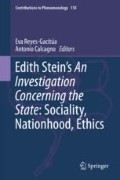Abstract
This paper explores the possible relationship between Stein’s early phenomenologicaI work on the state with her later Christian philosophy, especially her writings on figures like John of the Cross and Dionysus the Areopagite. Though Stein does not address spiritual theological questions in her political treatise, she raises the importance of the soul or psyche for the state insofar as all persons are constituted as lived body-soul-spirit unities: Persons are members of the state community and the state is conceived as a quasi-person. If we take seriously Stein’s later views of personhood, amplified by her theological discussion, the state, which is personal, can be said to come to bear some responsibility for the well-being of the spiritual soul of its people.
Access this chapter
Tax calculation will be finalised at checkout
Purchases are for personal use only
Notes
- 1.
In Collected Works of Edith Stein 10 (hereafter cited as IS).
- 2.
IS, 3.
- 3.
Ibid., 192.
- 4.
Stein, “Una investigación sobre el Estado,” 653. Translation mine.
- 5.
In Collected Works of Edith Stein 6.
- 6.
“Since the church has raised the saint to be a Doctor of the Church, anyone who wishes to gain information in the sphere of Catholic doctrine on questions of mysticism may look to him. And far beyond the boundaries of the Catholic Church, he is also recognized as one of the leading spirits, a reliable signpost, which no one who earnestly wishes to advance in the mysterious realm of the interior life may bypass. And yet John of the Cross has not given a systematic delineation of mysticism” (Stein 2002a: 1163–66).
- 7.
In Collected Works of Edith Stein, vol. 8, chap. 5.
- 8.
Stein, Knowledge and Faith, 2072–77.
- 9.
Ibid., 2109–11.
- 10.
“By using the term knowledge to express the act of mystical consciousness, perhaps we won’t come to understand its most original aspect. In fact, the depth of mystical experience is not considerably related to the knowledge such as the vital-affective union with the Absolute. This union can be expressed in an ontological manner (expressing itself then in terms of identity and unity) or in a personalistic manner (it will refer then, particularly in Christianity, to union of love and even of spiritual marriage)” (Bernard 2018: 550).
- 11.
Stein, The Science of the Cross, 3743–51.
- 12.
Bernard, Spiritual Theology, 554.
- 13.
Ibid., 558–59.
- 14.
Stein, The Science of the Cross, 3889–96.
- 15.
John of the Cross, “For who can describe that which He shows to loving souls in whom He dwells? Who can set forth in words that which He makes them feel? And, lastly, who can explain that for which they long? Assuredly no one can do it; not even they themselves who experience it.” Spiritual Canticle, prologue 1. He continues, “Notwithstanding the marvellous mysteries which holy doctors have discovered, and holy souls have understood in this life, many more remain behind. There are in Christ great depths to be fathomed, for He is a rich mine, with many recesses full of treasures, and however deeply we may descend we shall never reach the end, for in every recess new veins of new treasures abound in all directions.” (John of the Cross 2000: stanza 37.3).
- 16.
The term “political charity” appears already used (and most probably for the first time in the field of the Magisterium of the Church) by Pius XI in his speech of 18 December 1927 to the Italian Catholic Federation of University Students (Federazione Universitaria Cattolica Italiana, FUCI). If Mussolini had accused the FUCI of going beyond the proselytism and incurring political activity, Pius XI will proclaim that politics, as it takes care of the interest of the whole society, constitutes “the field of the broadest charity: the political charity” and upon which there is no other point than the same religion. Cf. Lorenzo Cappelletti, “The International Imperialism of Money,” 30 Days, n° 4 (2009), http://www.30giorni.it/articoli_id_21060_l3.htm; Análisis Digital, “La Caridad política. De Pío XI al…papa Francisco,” blog entry by Teófilo González, July 5, 2014, http://www.analisisdigital.org/2014/07/05/la-caridad-politica-de-pio-xi-alpapa-franscisco-2/
References
Ales Bello, Angela. 2002. Edith Stein, Phenomenology, the State and Religious Commitment. Analecta Husserliana, vol. 80, 648–656. Dordrecht: Springer.
Bernard, Charles André. 2018. Spiritual Theology: Toward the Fullness of Life in the Spirit. English version retrieved from http://www.sigueme.es/libros/teologia-espiritual.htm.
Calcagno, Antonio. 2002. Edith Stein: Is the State Responsible for the Immortal Soul of the Person? Logos 5(1, Winter): 62–75.
John of the Cross. 2000. A Spiritual Canticle of the Soul and the Bridgeroom Christ. Michigan: Christian Classics Ethereal Library. http://www.ccel.org/ccel/john_cross/canticle.html.
Solon, Ari M. 2001. State, Law and Religion in Edith Stein’s Thought. International Journal for the Semiotics of Law 14 (206): 215–221.
Stein, Edith. 2000. Knowledge and Faith. Trans. Walter Redmond. In The Collected works of Edith Stein, ed. Dr. L. Gelber and Michael Linssen, vol. 8. Washington, DC: ICS Publications. Kindle Edition.
———. 2002a. The Science of the Cross. Translation by Josephine Koeppel. In The Collected works of Edith Stein, vol. 6,. Washington, DC: ICS Publications, 2002. Edition for Kindle.
———. 2002b. Una investigación sobre el Estado. In Obras Completas, ed. J. Urkiza y F. J. Sancho, vol. 2, Escritos filosóficos. Etapa fenomenológica, 521–653. Burgos: Monte Carmelo.
———. 2007. An Investigation Concerning the State. Trans. Marianne Sawicki. In The Collected works of Edith Stein, vol. 10. Washington, DC: ICS Publications.
Author information
Authors and Affiliations
Corresponding author
Editor information
Editors and Affiliations
Rights and permissions
Copyright information
© 2020 Springer Nature Switzerland AG
About this chapter
Cite this chapter
Pinilla, J.F. (2020). Religion, Mysticism, and the State. In: Reyes-Gacitúa, E., Calcagno, A. (eds) Edith Stein’s An Investigation Concerning the State: Sociality, Nationhood, Ethics. Contributions to Phenomenology, vol 110. Springer, Cham. https://doi.org/10.1007/978-3-030-33781-0_7
Download citation
DOI: https://doi.org/10.1007/978-3-030-33781-0_7
Published:
Publisher Name: Springer, Cham
Print ISBN: 978-3-030-33780-3
Online ISBN: 978-3-030-33781-0
eBook Packages: Religion and PhilosophyPhilosophy and Religion (R0)

